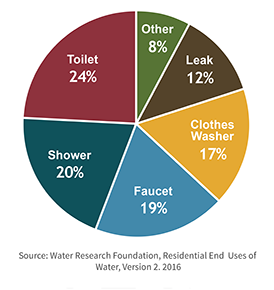Water Conservation
In the United States, access to clean, safe drinking water is something we largely take for granted. Yet water scarcity is affecting many parts of the country, while demand continues to increase. This is leading to water stress, which you can learn more about on our Environment and News pages.
Water stress makes water conservation at home more important than ever, because the adage “every drop counts”, really is true when millions of our neighbors are experiencing the same thing.
What Can I Do?
All of us can make wise water choices to conserve water (and save money) every day. And once these become habit, they require very little thought or effort. The tips below are a start, and the US Environmental Protection Agency's (EPA) WaterSense website has plenty more.
Additionally, periodically checking your home plumbing system for leaks will ensure you’re not simply wasting water. This can potentially save you hundreds of dollars on your annual water bill.
How Do I Measure My Consumption?
The most accurate way to understand your water consumption is by looking at the consumption tables on your water bill or My Utility Account. These will help you track monthly use and compare it to previous periods. Has your water use been increasing? Is this something you can explain, or have household habits changed? Or perhaps you have a leak. There's an easy way to test for leaks in your system using your Water Meter.
How Does My Household Compare?
Knowing how your water use compares to average consumption is a first step to conserving water and making improvements.
How Much Water Do We Use?

According to the Water Research Foundation, the average American family home uses about 300 gallons of water per day. Roughly 70% of that is indoors and 30% outdoors. Naturally, outdoor use varies greatly by region and type of home.